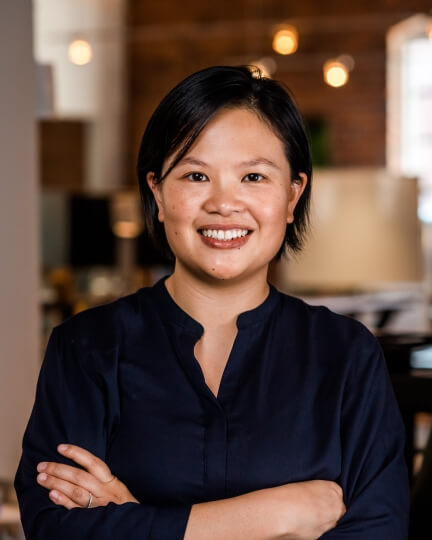Kyna Fong, A.B./S.M. '03 (Elation Health)
Kyna Fong, A.B./S.M. '03, has never forgotten the experience of working in her father’s primary care practice while growing up in California. She saw how critical trust is between physician and patient and how administrative tasks can take away from building that relationship.
“If you don’t trust your doctor, do you tell them everything?” Fong said. “And without knowing everything, even the best-trained doctor might not be able to determine what’s actually happening so they can help you. And doctors can wish things for their patients, such as changing their diet or seeing a specialist, but how much the patient follows through is based on trust. That’s the heart of care, and unfortunately the U.S. healthcare system is a maze, and you have to navigate it.”
Those experiences stuck with Fong through her time as an applied math concentrator, with a concurrent master’s in computer science, at the Harvard John A. Paulson School of Engineering and Applied Sciences (SEAS). She carried them through a Ph.D. in economics at Stanford, where in 2008 she became an Assistant Professor of Economics. Then one day, Fong and her older brother Conan went to visit their father’s practice to try to convince him to move from paper health records to an electronic system.
“We looked at all the platforms available, and ended up being really disappointed,” she said. “Everything was built for either billing or administrative purposes.”
Originally just wanting to help their dad, Fong and her brother began to devise their own electronic solution. That project eventually grew into Elation Health, an award-winning integrated electronic health record platform that supports all the different clinical and administrative tasks primary care practices work through every day. Founded in 2010, the company is now used by more than 36,000 clinicians serving 20 million patients across the country, and is recognized as a leader in advancing artificial intelligence for medical professionals.
“It’s proven again and again that primary care has pretty much the highest return on investment into the healthcare system,” she said. “We already don’t have enough physicians. We especially don’t have enough primary care physicians. We continue to be focused on making technology better and more effective so it can respect the sanctity of the patient-physician relationship.
Fong was just 16 years old when she came to Harvard, having started grade school a year early and then skipped a grade when her family moved from Edmonton to California right before she began high school. Her choice in college ultimately came down to Stanford or Harvard, and moving to the opposite coast offered the bigger adventure. Once here, she studied applied math and computer science. As a 19-year-old senior, she won a Thomas T. Hoopes Prize for outstanding undergraduate research.
“I’d always been really interested in math, and took advanced math classes when I was younger,” she said. “Applied math seemed a little more practical, but would still let me take all the math classes, plus interesting math-adjacent classes like statistics and economics. And then my economics Ph.D. heavily drew on my applied math background.”
SEAS not only helped her pursue a Ph.D. – it also gave her the technical skills she drew on in founding Elation. In the earliest days of the company, many of the engineering tasks fell to her, including coding the software platform.
“I learned to code as part of my applied math concentration, so that was critical to building Elation,” she said. “The biggest thing that I’ve carried forward is clarity of thinking, clarity of analysis, the ability to break down problems and communicate clearly about them. That’s super helpful, especially in a startup environment, where there are new problems every day. Being able to assess problems clearly, break them down, have frameworks for solving them or at least making progress, it stabilizes you and helps you navigate the ups and downs of company-building.”
With her background in math and computer science, engineering Elation’s first platform proved to be a complicated but relatively straightforward process. The entrepreneurial side proved more challenging. She was in her twenties when she founded Elation, and had to convince investors to support a first-time founder. It took two years to complete Elation’s Series A funding of $3 million, and the company has since gone through three additional fundraising series, its most-recent for $50 million in 2022.
Today, the San Francisco-based company has a few hundred employees and numerous accolades, including earning “Best in KLAS” for clinician satisfaction in 2025.
“The overarching theme I think about for people who start companies is that resilience is important,” she said. “That comes from being really passionate about the problem your company is solving. That’s what gets you through those inevitable moments where you wonder if what you're doing makes sense, does the world need it, can it be successful, and if it’s worth your time. Those are the real moments that require resilience. If you start a company, make sure you’re working on something that you won’t regret spending a decade of your life on.”
Press Contact
Matt Goisman | mgoisman@g.harvard.edu
